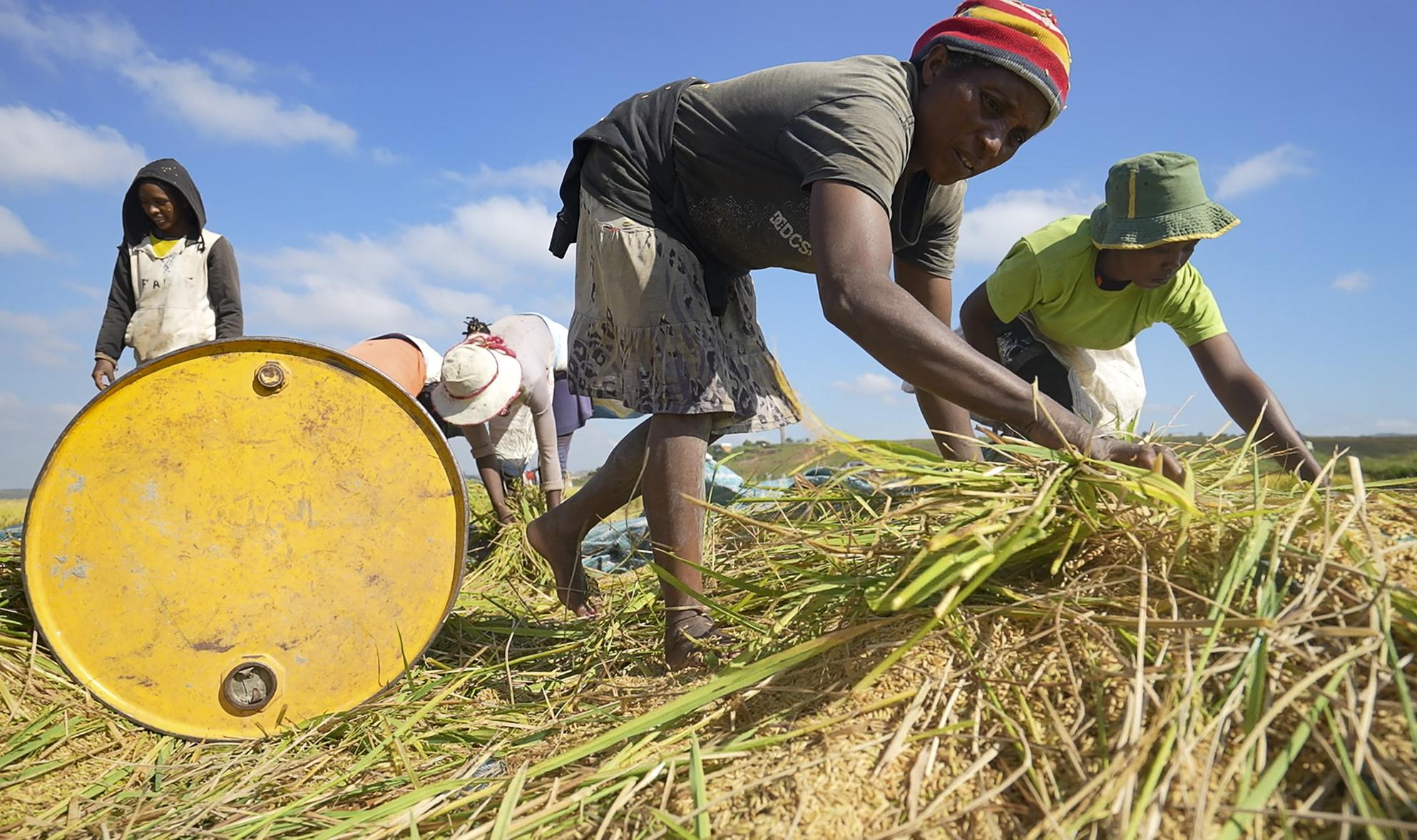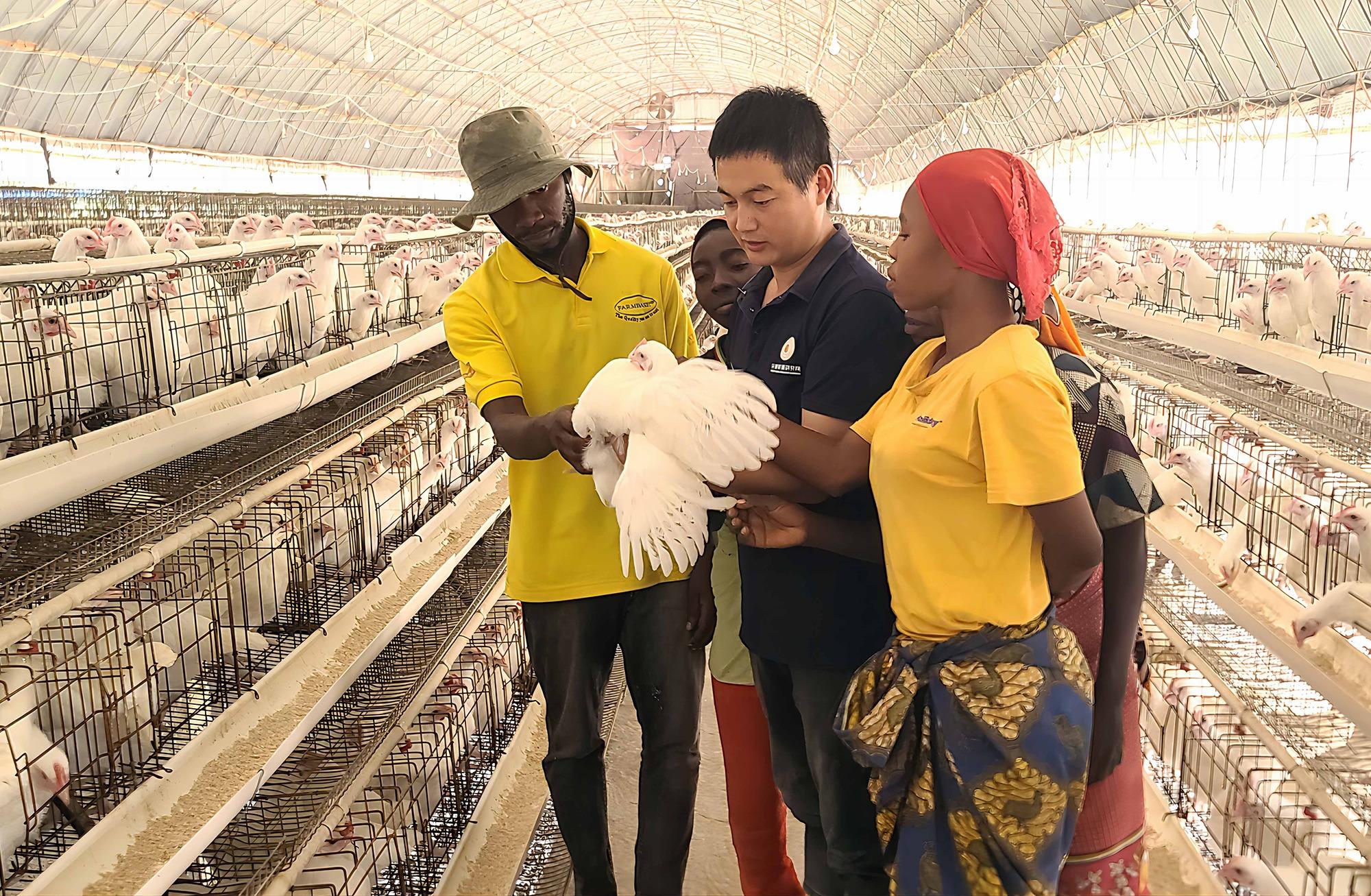 Farmers harvest hybrid rice at a demonstration plot grown with Chinese researchers' support in Madagascar in April. (GU PENGBO / FOR CHINA DAILY)
Farmers harvest hybrid rice at a demonstration plot grown with Chinese researchers' support in Madagascar in April. (GU PENGBO / FOR CHINA DAILY)
Two high-yield wheat varieties developed by Chinese and Pakistani scientists could be approved for commercial production in Pakistan as early as next year, said a lead researcher of the project.
The new varieties have strong resistance against yellow rust — a destructive crop disease widespread in Pakistan — and are expected to boost local wheat output by a large margin, said He Zhonghu, director of the China-Pakistan Joint Wheat Molecular Breeding International Lab. He is also a top wheat scientist at the Institute of Crop Sciences of the Chinese Academy of Agricultural Sciences as well as the International Maize and Wheat Improvement Center, a nonprofit research and training center headquartered in El Batan, Mexico.
"The crops are still being tested in experimental fields in Pakistan," he said, adding that the team is waiting for clearance from local authorities to mass produce the new varieties outside lab settings.
The Beijing-based Institute of Crop Sciences runs the lab in partnership with Pakistan's Quaid-i-Azam University and the National Agricultural Research Centre in the national capital Islamabad, through collaboration with the international maize and wheat center.
The lab was launched in March as part of a broader science and technology exchange program started by China to aid developing nations. It is tasked with testing and selecting Chinese germ plasm in Pakistan, training local scientists and researching new wheat varieties that can help boost the crop's yield in Pakistan.
Wheat is the most important food staple in Pakistan, but the crop's output per hectare is just half the level of that in China, experts said. The shortfall is due to a range of factors, such as the use of less-developed wheat varieties, insufficient application of fertilizers and pesticides, and a lack of mechanized farming, they added.
 Chinese technician Wang Zhennan (middle) teaches local workers how to raise chickens at a farm in Tanzania in September. (PHOTO / XINHUA)
Chinese technician Wang Zhennan (middle) teaches local workers how to raise chickens at a farm in Tanzania in September. (PHOTO / XINHUA)
In recent years, progress in molecular breeding research has bolstered wheat yields in China — now a frontrunner in the field, said He, the wheat scientist.
The use and development of enhanced wheat varieties is the latest example of fruitful agricultural exchanges between the neighbors under the Belt and Road Initiative.
Over the past decade, He said his institute has helped train more than 10 doctoral candidates from Pakistan. The wheat lab's director on the Pakistani side, Awais Rasheed, has been working with Chinese researchers for eight years.
The lab is also working on other varieties that suit local conditions in Pakistan, such as one that can thrive in the lower temperatures of the country's northern regions, He said. Heat-tolerant properties of the grain are also being researched to help ease the impact of rising global temperatures during summer.
He said that the lab — and the cross-border knowledge transfer it symbolizes — can help strengthen global food security against the backdrop of regional conflicts and climate change.
He and his colleagues have started similar exchanges with crop scientists in other countries, including Kazakhstan and Ethiopia, through means such as workshops and fellowships.
"Helping others, at the end of the day, is helping ourselves," he said. "About one-third of China's food products are imported, and helping other countries stabilize their food production helps stabilize global food prices and shield our countries from steep fluctuations."
China has signaled its willingness to expand agricultural exchanges and trade ties with its partners under the framework of the BRI to stabilize the global food supply and promote sustainable development.
While addressing a forum in Beijing last month, Vice-Minister of Agriculture and Rural Affairs Ma Youxiang said that over the past decade, China had forged partnerships with more than 90 countries and international organizations and inaugurated 650-plus investment projects worth $14 billion.


